

 Tuesday, a growing coalition of labor unions, environmental groups and tribes made clear that protecting the California Environmental Quality Act (CEQA), our state’s landmark environmental protection law, is essential to California’s future.
Tuesday, a growing coalition of labor unions, environmental groups and tribes made clear that protecting the California Environmental Quality Act (CEQA), our state’s landmark environmental protection law, is essential to California’s future.
Wealthy developers and corporate special interests have attacked CEQA as a hindrance to job creation, and are pushing to “reform” (i.e. gut) the law. But the facts just don’t support their claims. At an event [held] on the steps of the Capitol that morning, the Labor Management Cooperation Trust released a report that finds that since CEQA became law in 1970, California’s manufacturing output, construction activity, per capita GDP and housing (relative to population) all grew as fast or faster than the other 49 states.
The reality is that for more than 40 years, CEQA has been a firewall for California communities, protecting our environment and workplaces from big corporations and developers trying to make a quick profit at the expense of our health and safety.
» Read more about: Keep Predators Off the California Environmental Quality Act »


Let the hand-wringing begin! In last week’s primary election, just over 16 percent of Los Angeles voters turned out at the polls, less than four years ago, which was less than the election before that, which was less than the election before that – and on and on. In Southern California municipalities – big city or small – elections draw about 20 percent of the vote. This is a problem in a democracy.
Low turnouts mean that more and more money gets spent on fewer and fewer voters, and when only a small minority of voters go to the polls, elected officials make major policy decisions based on a narrower group of constituents. In a democratic society, where people are empowered to make decisions that affect their lives, fewer voters mean diminished participation and less accountability.
In the early 1980s, when reformers first took a majority of seats on the City Council in Santa Monica,
» Read more about: Diminishing Returns: Where Have All the Voters Gone? »


(Lisa Schiff is a member of Parents for Public Schools of San Francisco. Her post first appeared in BeyondChron and is republished with permission.)
A friend of mine emailed me last fall incredibly worried about the impact of potential sequestration cuts on schools and students across the country. He was a long-time Washington D.C.-based public education advocate, so I was simultaneously unshaken and unnerved by his concern. Sequestration seemed like a D.C.-based fear, so unlikely to actually happen given the blowback that would surely come from such imprecise cuts. But my friend’s many years of fighting for resources for children’s education meant that I couldn’t really ignore his concerns, and so his words remained a low-level worry until March 1, when I had to concede that he’d been right all along.
Funding for shared needs like education is always at risk and the past few weeks have highlighted just how great that risk is.


Shoddy political theater distracts people with vague demons called debt ceiling, fiscal cliff and now, sequester. Party leaders posture for major donors, media boosters and the faithful. They claim to save us from the demons. Meanwhile, backstage they all agree on austerity as the “necessary” response to “our major problem,” namely federal budget “imbalance.” “We” are spending “beyond our means,” accumulating “government debts.” So “we” must raise taxes and cut spending – impose austerity – to regain balance.
On January 1, payroll taxes rose (from 4.2 to 6.2 percent) for 150 million Americans. Their checks shrank as that regressive tax became more so. Obama’s hyped “tax increase for the rich” was comparatively trivial. It affected only the very few Americans earning over $450,000, raising their top tax rate from 35 percent to 39.6 percent. Our leaders hope we forgot the 1950s and 1960s, when the top tax rate was 91 percent. On March 1,


 To the let’s-cut-entitlements crowd, what’s wrong with America is that seniors are living too high off the hog. With the cost of medical care still rising (though not as fast as it used to), the government is shelling out many more dollars per geezer (DPG) than it is per youngster (DPY). The solution, we’re told, is to bring down DPG so we can boost DPY.
To the let’s-cut-entitlements crowd, what’s wrong with America is that seniors are living too high off the hog. With the cost of medical care still rising (though not as fast as it used to), the government is shelling out many more dollars per geezer (DPG) than it is per youngster (DPY). The solution, we’re told, is to bring down DPG so we can boost DPY.
We do indeed need to boost DPY. And we need to rein in medical costs by shifting away from the fee-for-service model of billing and paying. But as for changing the way we calculate cost-of-living adjustments for seniors to keep us from overpaying them — an idea beloved of Bowles, Simpson, Republicans and, apparently, the White House — this may not be such a hot idea, for one simple reason: An increasing number of seniors can’t afford to retire.
Nearly one in five Americans age 65 and over — 18.5 percent — were working in 2012,


Janice Slaughter often takes her 19-month-old granddaughter to the Tiny Tots child care center in Jackson, Mississippi, or picks her up in the afternoon so that her daughter, the baby’s mother, can attend school.
Slaughter brought her own children to the same center when they were babies and has known the owner for years.
But, soon, she and her daughter, who receives a federally funded child care subsidy administered by the state, will be required to scan their fingers on a device at Tiny Tots whenever they bring in the baby or pick her up. Everyone else will just walk right in and out.
Susan Williams scans her finger when she picks her daughter up from child care in Jackson, Mississippi. “I don’t mind it, but I really don’t see the point in it, I don’t understand why it’s necessary,” she said. “You have to stand in line and wait for it.”
“It’s inconvenient,
» Read more about: Fingerprinting Indigent Mothers and Other Shaming Rites »


I don’t know if Senate Minority Leader Mitch McConnell or House Speaker John Boehner read much history.
But this old history teacher wonders if the GOP’s stubborn refusal to seriously negotiate with the Democrats over the sequester cuts is more cribbing from Andy Jackson’s 1824 political playbook.
That year, Old Hickory lost the presidency to John Quincy Adams. Immediately, Jackson set out to make Adams a one-termer.
Jackson sent the word to pro-Jackson members of Congress: If Adams is for it, oppose it. If he’s against it, support it.
Jackson unseated Adams in 1828.
No sooner was Barack Obama elected president in 2008 than McConnell said the GOP’s top political priority was beating him in 2012. “Amens” rose from Boehner and the rest of the party. GOP lawmakers got their marching orders: If Obama’s for it, we’re not, and vice versa.
» Read more about: History Games: The Sequester as Punishment »


 Searching for Sugar Man, the Oscar-winning documentary film by Swedish director Malik Bendjelloul, hits you in the heart. You walk out of the theater feeling the world can be redeemed — and that it is possible for a person to be recognized for their talents and contributions even after years of obscurity and seeming inconsequence. If it could happen to a musician called Rodriguez then, perhaps, it could happen to the hundreds of other equally talented and modest people in this world.
Searching for Sugar Man, the Oscar-winning documentary film by Swedish director Malik Bendjelloul, hits you in the heart. You walk out of the theater feeling the world can be redeemed — and that it is possible for a person to be recognized for their talents and contributions even after years of obscurity and seeming inconsequence. If it could happen to a musician called Rodriguez then, perhaps, it could happen to the hundreds of other equally talented and modest people in this world.
Sixto Rodriguez, so named because he was the sixth child born to his mother, was a handsome, lithe, enigmatic singer/songwriter in 1970s Detroit who released two albums of haunting, alienated songs and then seemingly sank into oblivion. Except one of his albums made it to Cape Town, South Africa and got passed hand to hand where its songs were picked up by the anti-apartheid music scene as anthems of a sort for a generation.
» Read more about: Films in Review: “Searching for Sugar Man” »


Growing up, I saw Leimert Park as our version of Harlem: the center of commerce, music and culture for the African-American community in Los Angeles. The last time I was in Leimert Park, I saw shuttered storefronts and empty sidewalks — a stark difference from the hustle and bustle I knew from growing up not far from there. I am sure that it is even more of a shock for the generations of Crenshaw residents before me.
We now have an opportunity to revitalize this once economically thriving community, though, via the Crenshaw/LAX Line, a $1.8 billion light-rail project expected to start construction in early 2014. There is a catch – a Leimert Park station, which would be the crown jewel of the line, is startlingly missing from current plans. There needs to be a Leimert Park station.
Last May, community residents and advocates packed the Metro board room in hopes of hearing good news about the inclusion of their community in the proposed stations.


 Today the Dow Jones Industrial Average rose above 14,270 – completely erasing its 54 percent loss between 2007 and 2009.
Today the Dow Jones Industrial Average rose above 14,270 – completely erasing its 54 percent loss between 2007 and 2009.
The stock market is basically back to where it was in 2000, while corporate earnings have doubled since then.
Yet the real median wage is now eight percent below what it was in 2000, and unemployment remains sky-high.
Why is the stock market doing so well, while most Americans are doing so poorly? Four reasons:
First, productivity gains. Corporations have been investing in technology rather than their workers. They get tax credits and deductions for such investments; they get no such tax benefits for improving the skills of their employees. As a result, corporations can now do more with fewer people on their payrolls. That means higher profits.
Second, high unemployment itself. Joblessness all but eliminates the bargaining power of most workers – allowing corporations to keep wages low.
» Read more about: Wall Street: Bull Market for Stocks, Bear Cave for Workers »


 Last week, we reported on the legal struggle at port trucking company Seacon Logix, whose drivers filed claims with the California Division of Labor Standards Enforcement (DLSE) seeking reimbursement for a number of wage-and- hour violations, including illegal paycheck deductions made by the company. After the DLSE ruled in favor of the drivers in early 2012 – finding that the drivers were not independent contractors, but were actually misclassified employees – the company appealed the ruling.
Last week, we reported on the legal struggle at port trucking company Seacon Logix, whose drivers filed claims with the California Division of Labor Standards Enforcement (DLSE) seeking reimbursement for a number of wage-and- hour violations, including illegal paycheck deductions made by the company. After the DLSE ruled in favor of the drivers in early 2012 – finding that the drivers were not independent contractors, but were actually misclassified employees – the company appealed the ruling.
On Thursday, a California Superior Court judge ruled in favor of the drivers in every respect, coming to the same conclusions as the DLSE. The court found that drivers were misclassified and ordered the company to pay the four drivers $107,802. Five additional drivers at the same company have similar claims pending.
This is the first in an anticipated wave of rulings addressing conditions for misclassified port truck drivers.
» Read more about: Court: Seacon Logix Port Truck Drivers Are Misclassified »


 In societies across the globe, men demonstrate their manhood in different ways. There are many wonderful tracts on the topic. However, in the culture of Washington DC, the best way to demonstrate your manhood is to express your willingness to cut Medicare and Social Security. There is no better way to be admitted into the club of the Very Serious People.
In societies across the globe, men demonstrate their manhood in different ways. There are many wonderful tracts on the topic. However, in the culture of Washington DC, the best way to demonstrate your manhood is to express your willingness to cut Medicare and Social Security. There is no better way to be admitted into the club of the Very Serious People.
This is the reason that we saw White House spokesman Jay Carney tell a press conference. He told the reporters that President Obama is still willing to cut Social Security benefits by using the chained Consumer Price Index as the basis for the annual cost of living adjustment (COLA). This willingness to cut the benefits of retirees establishes President Obama as a serious person in elite Washington circles.
While most of the DC insiders probably don’t understand the chained CPI, everyone else should recognize that this technical fix amounts to a serious cut in benefits.
» Read more about: Why the Chained Consumer Price Index Threatens Our Elderly »
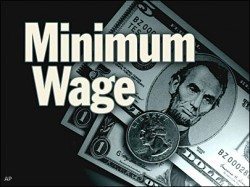
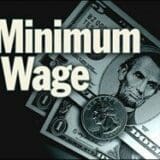
When President Obama proposed an increase in the federal minimum wage last month, you could almost hear conservative economists and pundits smacking their lips in anticipation. After all, there’s nothing that gets this crowd going like mandating a wage increase, even if it’s from the downright Dickensian $7.25 currently required, to a still paltry $9 — or just under $19,000 a year.
Minimum wage foes almost always base their opposition on the supposed damage that these laws do to the businesses that have to pay them and the workers who receive them. Despite reams of research to the contrary, they persist in claiming that minimum wage increases force businesses to lay off workers, hurting the very people who should benefit.
There is another argument, however, against minimum wage laws, one that was trotted out in a column by Slate’s Matt Yglesias. The real problem with these laws is not that they hurt workers and their employers,
» Read more about: The Right to Be Poor: Matt Yglesias’ View of Minimum Wage Laws »
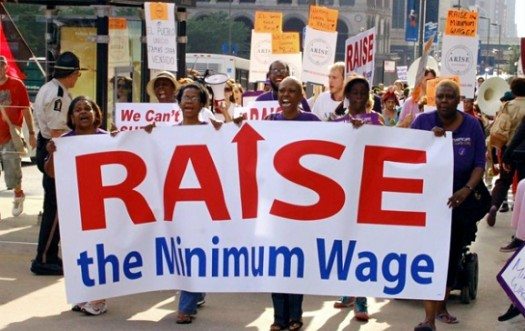
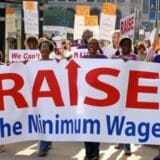
Sustainable economies are built on good jobs. If people don’t earn enough money, they can’t keep the economy growing by buying goods and services.
This basic fact is lost on opponents of minimum-wage increases, who for decades have been arguing that these pay hikes hurt businesses, cause job loss and therefore are bad for the economy.
Repetition of an argument might keep it in the news, but it doesn’t make it factually credible. So it is with minimum-wage rejectionists, who have succeeded in getting at least equal time for their assertions with every proposed wage increase, even though their claims have been debunked over and over again.
It is no surprise, then, that the Reason Foundation’s Adam Summers in his op-ed in the Business Journal predicts dire consequences if California were to increase its minimum wage law (“Higher Minimum Wage Will Lower Job Prospects,” February 11).
» Read more about: Raising the Minimum Wage Will Lift the Economy »


 If you watched any one of the recent Los Angeles mayoral debates, you likely concluded that the biggest issue in this election is who voters can trust to get the city’s fiscal house in order.
If you watched any one of the recent Los Angeles mayoral debates, you likely concluded that the biggest issue in this election is who voters can trust to get the city’s fiscal house in order.
But what does it really mean to be a good fiscal watchdog in the city of Los Angeles? As a long-time city commissioner and community leader, I have found that the biggest demonstration of strong leadership is the willingness to stand up to the powerful corporate interests and their lobbyists, who continue to dominate most of the decisions made at City Hall.
In 2012, “clients” spent more than $35 million on lobbyists hired to influence City Hall decision-makers. For-profit corporations accounted for more than $31 million of that. Unions spent less than $700,000 on paid lobbyists. The list of companies paying lobbyists to represent their interests at City Hall is a Who’s Who of corporate America.
» Read more about: Our Next Mayor Must Stand Up to Corporate Lobbyists »
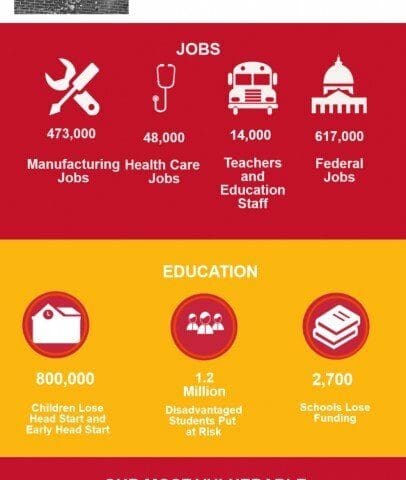
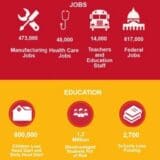
(This article, which first appeared on Equal Voice, includes information from Equal Voice News reporter Kathy Mulady and Associated Press writers Nedra Pickler, Jim Kuhnhenn and Stephen Ohlemacher. Please see Equal Voice’s infographic at the end of this post. Republished with permission.)
Unless sequestration is stopped by an act of Congress, the budget cutting will [contine], reducing funding to thousands of programs that took years to build, and provide a safety net for millions of poor working families.
Under the plan, every dollar approved each year by Congress [will] be slashed by a uniform amount, resulting in at least temporary layoffs for hundreds of thousands of public and private-sector workers. Programs like Medicare and Social Security are exempt, but the slashing of other programs will slow the nation’s fragile economic recovery.
On March 1 automatic cuts of $85 billion from a $3.6 trillion budget [began].
» Read more about: The Sequester: Families and Kids Not on Congress’ Agenda »


We present the following guide to show where three front-running mayoral candidates stand on issues affecting jobs and the local economy. Except as noted, all quotes are drawn from our interviews with the candidates. (Jan Perry did not respond to interview requests.) Please note that Frying Pan News does not endorse candidates.
Issue
Eric Garcetti
Wendy Greuel
Kevin James




Quality Jobs
Most important.
Most important.
Jobs are extremely important but depend on a revitalized business sector.
Quote
“The first thing on my agenda is putting this city back to work, making City Hall work for everybody but then also getting jobs back here — good, middle-class, decent-paying jobs with benefits.”
“I will be the jobs tsar. I will be the person in the city that is going to go out and talk to businesses and encourage them to move to the city of Los Angeles and to grow.”
“We have a shockingly high unemployment rate – it’s 50 percent higher than the national average.
» Read more about: Where Mayoral Candidates Stand on Jobs and the Economy »


“In 1933 we reversed the policy of the previous Administration. For the first time since the Depression you had a Congress and an Administration in Washington which had the courage to provide the necessary resources which private interests no longer had or no longer dared to risk.
This cost money. We knew, and you knew, in March, 1933, that it would cost money. We knew, and you knew, that it would cost money for several years to come. The people understood that in 1933. They understood it in 1934, when they gave the Administration a full endorsement of its policy. They knew in 1935, and they know in 1936, that the plan is working.”—FDR, 1936
Eighty years ago this month, at the height of the worst economic crisis in our nation’s history, Franklin D. Roosevelt delivered on his promise to launch a New Deal for the American people.
» Read more about: The Sequester Puts Humanity Last — FDR Put It First »
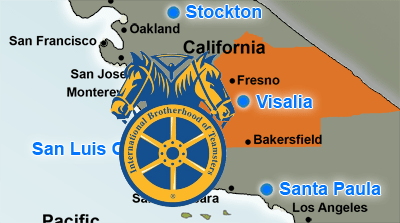

 On February 14, 68 employees of VWR in Visalia voted affirmatively to join Teamsters Local 948 in an election supervised by the National Labor Relations Board. The election punctuates a very high profile and controversial move by the company from the Bay Area to Visalia and continues the Teamsters struggle with the company.
On February 14, 68 employees of VWR in Visalia voted affirmatively to join Teamsters Local 948 in an election supervised by the National Labor Relations Board. The election punctuates a very high profile and controversial move by the company from the Bay Area to Visalia and continues the Teamsters struggle with the company.
VWR, which [distributes laboratory equipment], was founded as a local California company, has grown into a global corporation, reporting more than $4.1 billion in sales for 2011. The Teamsters have represented VWR employees at their distribution center in Brisbane for over 50 years. For most of that time, labor-management relations were good. But when Madison Dearborn, a Chicago-based private equity firm, bought the company in 2007 things quickly changed.
In the midst of contract negotiations in 2010, VWR announced plans to close its Brisbane distribution center and move its operations 220 miles south to a new 500,000 square foot facility in Visalia.
» Read more about: Teamsters Win Election at Runaway Company in Visalia »


Imagine a plot to undermine the government of the United States, to destroy much of its capacity to do the public’s business, and to sow distrust among the population.
Imagine further, that the plotters infiltrate Congress and state governments, reshape their districts to give them disproportionate influence in Washington, and use the media to spread big lies about the government.
Finally, imagine they not only paralyze the government but are on the verge of dismantling pieces of it.
Far-fetched? Perhaps. But take a look at what’s been happening in Washington and many state capitals since Tea Party fanatics gained effective control of the Republican Party, and you’d be forgiven if you see parallels.
Tea Party Republicans are crowing about the “sequestration” cuts beginning today (Friday). “This will be the first significant tea party victory in that we got what we set out to do in changing Washington,” says Rep.
» Read more about: Hostage Crisis: The Sequester and a Tea Party Plot »